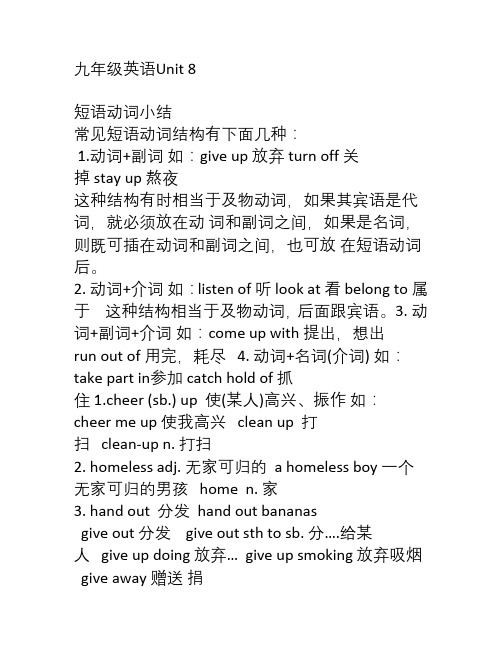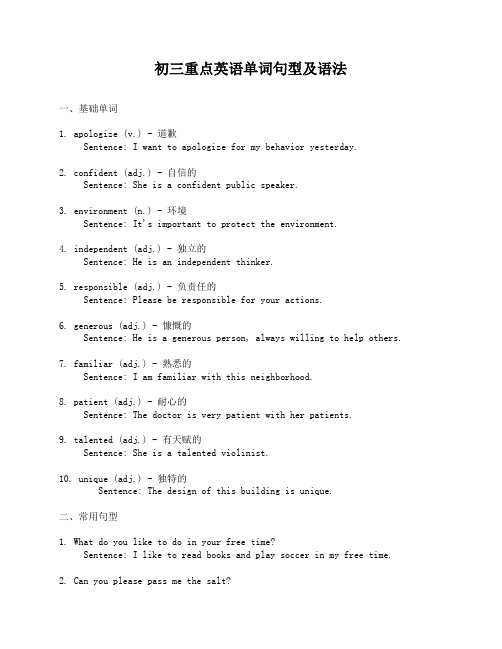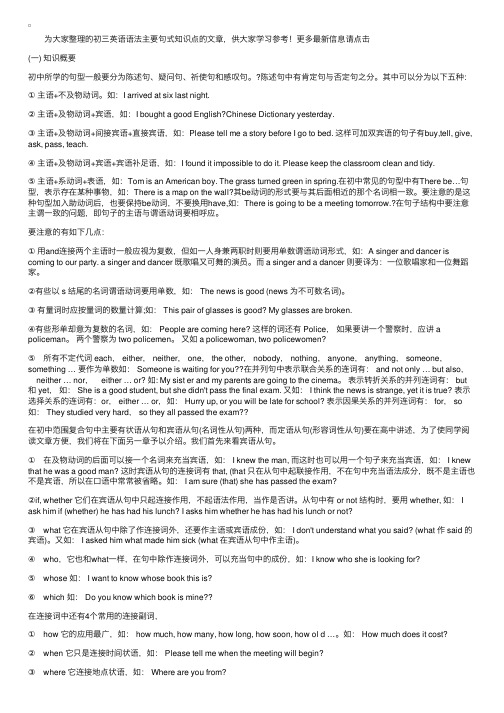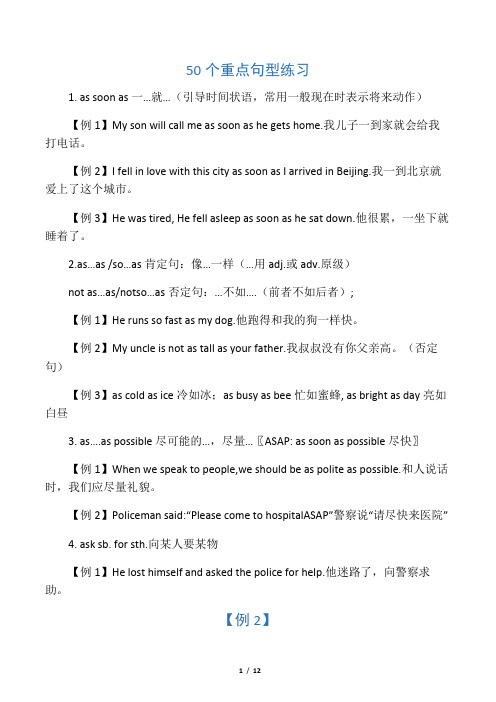初三英语重点句子及句型
- 格式:docx
- 大小:26.00 KB
- 文档页数:12

九年级英语Unit 8短语动词小结常见短语动词结构有下面几种:1.动词+副词如:give up 放弃 turn off 关掉 stay up 熬夜这种结构有时相当于及物动词,如果其宾语是代词,就必须放在动词和副词之间,如果是名词,则既可插在动词和副词之间,也可放在短语动词后。
2. 动词+介词如:listen of 听 look at 看 belong to 属于这种结构相当于及物动词,后面跟宾语。
3. 动词+副词+介词如:come up with 提出,想出run out of 用完,耗尽 4. 动词+名词(介词) 如:take part in参加 catch hold of 抓住 1.cheer (sb.) up 使(某人)高兴、振作如:cheer me up 使我高兴 clean up 打扫 clean-up n. 打扫2. homeless adj. 无家可归的 a homeless boy 一个无家可归的男孩 home n. 家3. hand out 分发 hand out bananasgive out 分发 give out sth to sb. 分….给某人 give up doing 放弃… give up smoking 放弃吸烟give away 赠送捐赠 give away sth. to …. give away money to kid s give sb. sth. 给某人某东西 give me money 给我钱 give sth. to sb. 给某人某东西 give money to me 给我线 4. sick adj. 生病的作表语、定语ill adj. 生病的作表语,不能作定语 5. volunteer to do v. 志愿效劳、主动贡献 volunteer n. 志愿者6. come up with 提出想出 === think up 想出 catch up with 赶上追上 7. put off doing 推迟做某事 put on 穿上 (指过程) put up 张贴8. write down 写下记下9. call up 打电话 make a telephone call 打电话10. set up 成立建立The new hospital was set up in 2000. 这座医院是在2000年成立的。

初三英语全册重要短语和句型汇总Unit1 How can we become good learners?【重点短语】1. have conversation with sb. 同某人谈话2. too…to…太……而不能3. the secret to………的秘诀4. be afraid of doing sth./ be afraid to do sth. 害怕做某事5. look up 查阅6. repeat out loud 大声跟读7. make mistakes in 在……方面犯错误8. connect ……with…把……和……连接/联系起来9. get bored 感到厌烦10. be stressed out 焦虑不安的11. pay attention to 注意;关注12. depend on 取决于;依靠13. the ability to do sth.. 做某事的能力【考点详解】1. by + doing 通过……方式(by是介词,后面要跟动名词,也就是动词的ing形式)2. talk about 谈论,议论,讨论The students often talk about movie after class. 学生们常常在课后讨论电影。
talk to sb= talk with sb 与某人说话3. 提建议的句子:①What/ how about +doing sth.? 做…怎么样?(about后面要用动词的ing形式,这一点考试考的比较多)如:What/ How about going shopping?②Why don't you + do sth.? 你为什么不做…?如:Why don't you go shopping?③Why not + do sth. ? 为什么不做…?如:Why not go shopping?④Let's + do sth. 让我们做…...吧。

九年级英语Unit1《 How can we become good learners?》知识点【短语归纳】1. have conversation with sb. 同某人谈话2. too…to…太……而不能3. the secret to……的秘诀4. be afraid of doing sth./ be afraid to do sth. 害怕做某事5. look up 查阅6. repeat out loud 大声跟读7. make mistakes in 在……方面犯错误8. connect ……with…把……和……连接/联系起来9. get bored 感到厌烦10. be stressed out 焦虑不安的11. pay attention to 注意;关注12. depend on 取决于;依靠13. the ability to do sth.. 做某事的能力14. first of all 首先15 take notes 做笔记,做记录16. enjoy doing sth .16. native speaker 说本族语的人17. make up 组成、构成18. be angry with sb. 对某人生气 19.each other 彼此20.too many :许多,修饰可数名词 too many girlstoo much :许多,修饰不可数名词 too much milk(too many和 too much)much too :太,修饰形容词 much too beautiful21.change… into…将…变为…22. with the help of sb. == with one's help 在某人的帮助下with the help of LiLei == with LiLei's help 在李雷的帮助下23. compare … to … : 把…与…相比(compare with拿…和…比较)【单元知识点】1. by + doing :通过……方式2. talk about 谈论,议论,讨论The students often talk about movie after class. 学生们常常在课后讨论电影。

人教版九年级英语第三单元重点短语及句型知识点小结Unit 3 could you please tell me where the restrooms are?一.重点短语1. turn left/right 向左/右转2. on one’ s left/right 在某人的左/右边3. go along Main Street 沿着主大街走4. have dinner 吃饭5.go to the third floor 去三楼6. a room for resting 休息室7. be special about.. . 有……独特之处8. pardon me 请再说一次9. come on 过来;加油10. one one’ s way to... 在去.......的路上11. something to eat一些吃的东西12. hold one’ s hand 抓住某人的手13. mail(send) a letter 寄信14. pass by 路过15. a rock band 摇滚乐队16. in the shopping center 在购物中心17. in some situations 在某些场合18. park one’ s car 停车19. an underground parking lot地下停车库20. such as 例如21. thank sb. for doing sth. 为…感谢某人22. look forward to…期盼…23. meet sb. for the first time 第一次见到某人24. in a rush to do sth. 仓促地做某事25. be convenient to do sth. 做某事很方便二.重点句型1. not…until…You never know until you try something.2. It seems (that)…It seems a rock band plays there every evening.3. do you know...例:Excuse me, do you know where I can buy some medicine?Do you know when the bookstore closes today?4. Could you please tell me... ?Could you please tell me how to get to the post office?5.sb. suggest+ 从句(虚拟语气:should+V )例:The clerk suggests they go to the museum.6.take的用法① take some food take some medicine (=have吃,喝)① take notes做笔记① take one’s temperature ( 测量)① It takes sb some time/money to do something (花费,需要)① I’ll take this coat.(=buy购买)① take somebody / something to (带领,拿去,取)①take a train to Chongqing (乘坐)① take off(脱下)2.turn 的用法turn to page 80 翻到It is your turn.轮到你了。

九年级英语上册Unit 2重点短语句型归纳Topic 11. 看到鱼儿游来游去see fish swimming (see sb. doing sth.)2. 去野餐have a picnic/go for a picnic3. 城市面貌the look of our cities4. 把废水倒入河里pour waste into river5. 有用的事物something useful6. 忍受/改善/保护环境stand /improve / protect the environment7. 产生难闻的气味produce terrible gas8. 情绪好/差in a good / bad mood9. 设法做某事manage to do sth.10. 感到不舒适feel uncomfortable11. 对某人/某物有害be harmful to sb. / sth.(do harm to sb./sth.)12. 目前,现在at present13. 写信给某人write to sb.14. 发出太多的噪音make too much noise15. 打扰别人disturb others16. 一种污染 a kind of pollution17. 对做了某事感到抱歉be sorry for doing sth.18. 各种各样的all sorts of / all kinds of19. 在吵杂的条件下in noisy conditions20. 变聋了go / become deaf21. 听力丧失have hearing loss22. 相当多quite a few23. (几乎)与……一样差no better than24. 引发高血压cause high blood pressure25. 在强烈、易变的光线下in strong, changeable light26. 在许多方面in many ways27. 随着人口的增长with the increase in population28. 随着工业的发展with the development of industry29. 对我来说很难呼吸。

初中英语重点句型结构+练习(答案)一、初中英语主要句型1. It's+adj.+for sb.+to do sth. 对某人来说做某事怎么样,如:It is dangerous for children to play in the street. 孩子们在街上玩是很危险的。
2. It's time for sth. 是干某事的时间了;It's time(for sb.)to do sth.该干某事了。
如:①It's time for the meeting. 该开会了。
②It's time for us to go to school. 我们该上学了。
3. It takes sb. some time to do sth. 做某事花某人一些时间。
sb. spend some time/money on sth./(in)doing sth. 某人花时间(金钱)在某事上/花时间(金钱)干某事。
sth. cost sb. some money 某事花某人一些钱。
pay some money for sth.为某事(物)付钱。
如:① It took me two hours to write the letter. 写这封信花了我两小时的时间。
②He spends half an hour(in)reading English every morning.他每天早上花半小时读英语。
③ He spends one hour on the housework every day. 他每天花一小时做家务。
④ The bike cost me 500 yuan. 这辆自行车花了我500元。
⑤ I spent 500 yuan on the bike. 我买这辆自行车花了500元。
⑥ I paid 500 yuan for the bike. 我花了500元买这辆自行车。

人教版九年级英语第七单元重点短语及句型知识点小结Unit 7 Teenagers should be allowed to choose their own clothes.一.重点短语1. choose their own clothes选择自己的衣服2. be serious about对…认真,严肃3. care about担心4. eight hours’ sleep八小时的睡眠5. driver’s/driving license驾照6. instead of doing sth代替做某事7. wear uniforms穿校服8. be good for对…有益be bad for对…有害9. a fifteen-year-old boy一个15岁的男孩10. talk back回嘴,顶嘴11. volunteer to do sth志愿做某事12. make my own decision 做自己的决定13. old people’s home养老院14. the importance of …的重要性15. make sure确保16. a professional runner一个专业的赛跑者17.keep…away from远离get in the way of挡…路;妨碍18. stay up 熬夜19. a part-time job兼职20. be strict with sb. 对某人严厉be strict in sth对某事严厉二.重点句型1.She is a sixteen-year-old girl.=She is sixteen years old.2. allow sb. to do sth. 允许某人做某事(主动语态)be allowed to do sth. 被允许做某事(被动语态)Mother allows me to watch TV every night.LiLy is allowed to go to America.3. get their ears pierced 穿耳洞让/使(别人)做某事get sth. done(过去分词)have sth. doneI get my hair cut. == I have my hair cut.4. enough 足够形容词+enough 如:beautiful enough足够漂亮enough+名词如:enough food 足够食物enough…to 足够…去做…例:I have enough money to go to Beijing. 我有足够的钱去北京。

九年级英语上册知识点汇总Unit1 The Changing World Topic1 Our country has developed rapidly.【短语和句型归纳】1.have a good summer holiday暑假过得愉快e back from从......回来3.have/has been to去过4.have/has gone to去了5.not...any more再也不...6.take photos照相7.by the way顺便问一下8.take part in参加9.around/all over/throughout the world全世界10.tell sb.something about...告诉某人关于某事11.have/live a happy/hard life过着幸福/艰苦的生活12.describe...in detail详细描述13.give support to支持...14.see...oneself亲眼看见15.keep in touch with与...保持联系16.far away遥远的17.kinds/sorts of各种各样的...18.not only...but also不仅...而且...19.make progress取得进步20.more than/over多于21.develop/improve rapidly迅速发展/改善22.tell sb.(not)to do sth.告诉某人(别)做某事23.ask sb.(not)to do sth.要求某人(别)做某事24.in order to do sth.为了做某事25.have to do sth.不得不做某事26.It s+形容词+for sb.to do sth.对于某人来说做某事是...的27.why not do sth.为什么不做某事28.succeed/be successful in doing sth.成功地做某事29.dream about doing sth.梦想做某事30.see/hear sb.do/doing sth.看见/听见某人做/正在做某事【语法点归纳】现在完成时一.现在完成时的基本结构肯定句:主语+have/has+动词的过去分词+其他否定句:主语+have/has+not+动词的过去分词+其他一般疑问句:Have/Has+主语+动词的过去分词+其他特殊疑问句:特殊疑问词+一般疑问句(have/has+主语+过去分词+其他)二.现在完成时的用法1.现在完成时用来表示过去已经完成的动作对现在造成影响或后果。

初三英语九年级全部知识点及英语提分秘籍1Unit 1 How can we ... learners?【重点短语】1. have conversation with sb. 同某人谈话2. too…to…太……而不能3. the secret to………的秘诀4. be afraid of doing sth./ be afraid to do sth. 害怕做某事5. look up 查阅6. repeat out loud 大声跟读7. make mistakes in 在……方面犯错误8. connect ……with…把……和……连接/联系起来9. get bored 感到厌烦10. be stressed out 焦虑不安的11. pay attention to 注意;关注12. depend on 取决于;依靠13. the ability to do sth.. 做某事的能力【考点详解】1. by + doing 通过……方式(by是介词,后面要跟动名词,也就是动词的ing 形式)2. talk about 谈论,议论,讨论The students often talk about movie after class. 学生们常常在课后讨论电影。
talk to sb= talk with sb 与某人说话3. 提建议的句子:①What/ how about +doing sth.? 做…怎么样?(about后面要用动词的ing形式,这一点考试考的比较多)如:What/ How about going shopping?②Why don't you + do sth.? 你为什么不做…?如:Why don't you go shopping?③Why not + do sth. ? 为什么不做…?如:Why not go shopping?④Let's + do sth. 让我们做…...吧。

初三重点英语单词句型及语法一、基础单词1. apologize (v.) - 道歉Sentence: I want to apologize for my behavior yesterday.2. confident (adj.) - 自信的Sentence: She is a confident public speaker.3. environment (n.) - 环境Sentence: It's important to protect the environment.4. independent (adj.) - 独立的Sentence: He is an independent thinker.5. responsible (adj.) - 负责任的Sentence: Please be responsible for your actions.6. generous (adj.) - 慷慨的Sentence: He is a generous person, always willing to help others.7. familiar (adj.) - 熟悉的Sentence: I am familiar with this neighborhood.8. patient (adj.) - 耐心的Sentence: The doctor is very patient with her patients.9. talented (adj.) - 有天赋的Sentence: She is a talented violinist.10. unique (adj.) - 独特的Sentence: The design of this building is unique.二、常用句型1. What do you like to do in your free time?Sentence: I like to read books and play soccer in my free time.2. Can you please pass me the salt?Sentence: Sure, here you go.3. I'm sorry, but I can't attend the party tonight.Sentence: That's okay, maybe next time.4. How was your weekend?Sentence: My weekend was great, I went hiking with my family.5. Could you please help me with my homework?Sentence: Of course, I would be happy to help.6. What time does the movie start?Sentence: The movie starts at 7:30 PM.7. Where is the nearest bus stop?Sentence: The nearest bus stop is just around the corner.8. I'm really excited about the school trip next week.Sentence: Me too, it's going to be a lot of fun.9. What do you want to be when you grow up?Sentence: I want to be a doctor and help people.10. How do you spell your name?Sentence: My name is spelled J-O-H-N.三、语法1. Present Simple Tense (一般现在时)- 表示经常发生的动作或事实。

九年级英语重点短语和句子Hello, here are some key phrases and sentences for Grade 9 English. 你好,以下是一些九年级英语的重点短语和句子。
"Be supposed to" is a common phrase used to express obligation or expectation.“Be supposed to”是一个用来表达义务或期望的常见短语。
"I'm supposed to finish my homework by tomorrow."“我应该在明天之前完成作业。
”"It's important to" is used to emphasize the significance of something.“It’s important to”用于强调某事的重要性。
"It's important to stay healthy by exercising regularly."“通过定期锻炼保持健康很重要。
”"In order to" is a phrase that introduces the means or method of achieving something.“In order to”是一个用来介绍实现某事的手段或方法的短语。
"In order to improve my grades, I need to study harder."“为了提高我的成绩,我需要更努力地学习。
”"Be afraid of" is used to express fear or apprehension towards something.“Be afraid of”用于表达对某事的恐惧或担忧。

九年级英语上册Unit3知识点归纳九年级英语上册Unit3知识点归纳 1.取钱 get some money 2.买一些杂志/邮票 get/buy some magazines 3.获取一些有关小镇的信息get some information about the town 4.买一双鞋 get/buy a pair of shoes 5.买一份报纸 buy a newspaper 6.买一本字典 buy a dictionary 7.买一些有票 buy some stamps 8.吃饭 have dinner 9.怎样到达… how t o get to sp 10.沿着 go along/ go down 11.在银行的旁边 beside the bank 12.在右边 on the right/left 13.在某人的右边on one’ s right 14.去三楼 go to the third floor 15.向左转 turn left/ right 16.在…之间between …and… 17.走过书店 go past the bookstore 18.做…激动 be excited to do sth.19.从/以…开始 start/ begin with 20.不必匆忙 not need to rush 21.有……独特之处be special about.. . 22.加油 , 过来 come on 23.休息室 a room for resting 24.请再说一次 pardon me 25.抓住某人的手hold one’ s hand 26.摇滚乐队 a rock band 27.起初 at first 28.在去.......的路上on one’ s way to... 29.经过、路过 pass by 30.开始玩 start playing 31.沿 ... 走;走上;走近walk up 32.在门边 at the door 33.在门旁 by the door: 34.在那个时刻 at that time 35.来得更早点 come a little earlier 36.占位子 get a table 37.一些吃的东西 something to eat 38.最近的银行 the nearest bank 39.寄信 mail a letter 40.在购物中心 in the shopping center 41.寻求帮助 ask for help 42.怎样有礼貌的寻求帮how to ask for help politely 43.学会怎样才是礼貌的 learn how to be polite 44.在不同的情况 in different situations 45.使用恰当的语言 use the suitable/right/proper language 46.立足于以…为根据 base on 47.取决于/依靠 depend on 48.引入一个请求 lead in to a request 49.停车park one’ s car 50.一个地下停车库an underground parking lot 51.换钱change money 52.去.......的路 the way to... 53.在一个说英语的的国家 in an English-speaking country 54.进行一个短期的假期学习 go on a short study vacation 55.为……感谢某人thank sb. for doing sth.56.期待 look forward to+n./doing 57.醒来 wake up 58.仓促地做某事 in a rush to do sth 59.做某事很方便 be convenient to do 60.第一次见到某人meet sb. for the first time 61.更擅长 become better at… 62.使…想起remind …of… 63.一个吃饭的好地方a good place to eat二、重点句型1. not…until… You never know until you try something. 凡事只有亲身经历了才能了解。

初三英语语法重点句型初三的小伙伴们,咱来唠唠英语语法里那些重点句型哈。
一、“It”句型。
1. It's + adj. + (for/of sb.) to do sth.这个句型超重要的。
要是说“做某事对某人来说是……(形容词)的”,就可以用这个。
比如说“It's important for us to study hard”(对我们来说努力学习是很重要的)。
这里用“for”的时候呢,形容词是形容事情的,像“important”“necessary”之类的。
要是形容词是形容人的品质的,像“kind”“nice”“clever”,就用“of”。
例如“It's kind of you to help me”(你帮助我,你真是太好了)。
2. It takes sb. some time to do sth.这个就是说“做某事花费某人多长时间”。
比如说“It takes me half an hour to walk to school”(步行去学校花费我半个小时)。
二、宾语从句。
1. 主句 + 引导词(that/if/whether/特殊疑问词)+ 宾语从句(陈述句语序)先来说说“that”引导的宾语从句,比如“I think that he is a good student”(我认为他是个好学生)。
这里“that”在口语里有时候还能省略呢。
要是表示“是否”,就可以用“if”或者“whether”。
像“I don't knowif/whether he will come tomorrow”(我不知道他明天是否会来)。
不过“whether”可以和“or not”连用,“if”不行哦。
要是从句是个特殊疑问句变成的宾语从句,那就要用特殊疑问词引导,而且得是陈述句语序。
例如“He asked me where I was from”(他问我来自哪里),不能说“He asked me where was I from”,那可就错啦。

人教版九年级英语重点单词短语句型默写目录人教版九年级英语重点单词短语句型默写 (1)Unit 1 重点单词短语句型默写 (1)Unit 2 重点单词短语句型默写 (2)Unit 3 重点单词短语句型默写 (3)Unit 4 重点单词短语句型默写 (4)Unit 5 重点单词短语句型默写 (5)Unit 6 重点单词短语句型默写 (6)Unit 7 重点单词短语句型默写 (7)Unit 8 重点单词短语句型默写 (8)Unit 9 重点单词短语句型默写 (9)Unit 10 重点单词短语句型默写 (10)Unit 11 重点单词短语句型默写 (11)Unit 12 重点单词短语句型默写 (12)Unit 13 重点单词短语句型默写 (12)Unit 14 重点单词短语句型默写 (13)一、单词默写1.教科书3.大声地5.句子7.表情;表示9.秘密11.重复13.物理15.发音(v.)17.速度19.天生的21.创造23.活跃的25.(使)连接27.知识;学问Unit 1 重点单词短语句型默写2.交谈(n.)4.发音(n.)6.有耐心的8.发现10.语法12.笔记14.化学16.增加18.同伴20.能力22.大脑24.注意;关注26.回顾;复习28.明智地二、重点短语默写1.通过…方式3.因为…5.对…感兴趣2.太…而不能4.也6.(在字典、参考书、电脑等)查阅;查找7.练习做某事9.向从…学习11.寻找13.例如15.(是…)而不是…8.依靠10.查明;发现12.即使14.与…连接联系三、重点句型默写1.你是怎样练习说英语的?2.我是通过小组合作来学习。
3.听磁带怎么样?4.太难去明白那些声音。
5.你读得越多,你会读得越快。
6.为什么魏芬发现学习英语是困难的?7.你是否能做得好取决于你的学习习惯。
8.成功的学习者有一些共同的好习惯。
9.即使你学好了某样东西,但是你也会忘记它,除非你使用它。
10.我想另一种成为一个成功的语言学习者的方法是努力用不同方式思考同样的事情。

为⼤家整理的初三英语语法主要句式知识点的⽂章,供⼤家学习参考!更多最新信息请点击(⼀) 知识概要初中所学的句型⼀般要分为陈述句、疑问句、祈使句和感叹句。
?陈述句中有肯定句与否定句之分。
其中可以分为以下五种:①主语+不及物动词。
如:I arrived at six last night.②主语+及物动词+宾语,如:I bought a good English?Chinese Dictionary yesterday.③主语+及物动词+间接宾语+直接宾语,如:Please tell me a story before I go to bed. 这样可加双宾语的句⼦有buy,tell, give, ask, pass, teach.④主语+及物动词+宾语+宾语补⾜语,如:I found it impossible to do it. Please keep the classroom clean and tidy.⑤主语+系动词+表语,如:Tom is an American boy. The grass turned green in spring.在初中常见的句型中有There be…句型,表⽰存在某种事物,如:There is a map on the wall?其be动词的形式要与其后⾯相近的那个名词相⼀致。
要注意的是这种句型加⼊助动词后,也要保持be动词,不要换⽤have,如:There is going to be a meeting tomorrow.?在句⼦结构中要注意主谓⼀致的问题,即句⼦的主语与谓语动词要相呼应。
要注意的有如下⼏点:①⽤and连接两个主语时⼀般应视为复数,但如⼀⼈⾝兼两职时则要⽤单数谓语动词形式,如:A singer and dancer is coming to our party. a singer and dancer 既歌唱⼜可舞的演员。
⽽ a singer and a dancer 则要译为:⼀位歌唱家和⼀位舞蹈家。

前李朱指导学校初三英语专项初中英语要点短语、句型汇总[短语、词组概括]由动词开头构成的短语、词组好多。
复习时应分类办理:一、动词+介词.lookat看,looklike看上去像,lookafter照顾.listento听.welcometo欢迎到.sayhelloto向问好.speakto对说话此类短语相当于及物动词,后来一定带宾语,但宾语不论是名词仍是代词,都要放在介词以后。
二、动词+副词“动词+副词”所构成的短语义分为两类:A.动词(vt.)+副词1.puton 穿上2.takeoff 脱下3.writedown 记下此类短语能够带宾语,宾语若是名词,放在副词前后皆可;宾语若是人称代词,只好放在副词的前方。
B.动词(vi)+副词。
1.comeon赶忙2.getup 起床3.gohome回家4.comein进来5.sitdown 坐下6.standup 起立此类短语属于不及物动词,不可以够带宾语。
三、其余类动词词组thedoorthesametowork/classillalook/seatsupperyoungshoppingTV/gamesplaygames[介词短语聚焦]“介词+名词/代词”所构成的短语称为介词短语。
现将Unitsl-16常用的介词短语按用法进行归类。
1.in+语言/颜色/衣帽等,表示使用某种语言或衣着。
2.in+Row/Team/Class/Grade等,表示“在排/队/班级/年级”等。
3.inthemorning/afternoon/evening/表示“在上午/下午/夜晚”等一段时间。
4.inthedesk/pencil-box/bedroom等表示“在书桌/铅笔盒/寝室里”。
5.inthetree表示“在树上(非树自己全部)”;onthetree表示“在树上(为树自己全部)”。
6.inthewall表示“在墙上(凹陷进去)”;onthewall表示“在墙上(指墙的1前李朱指导学校初三英语专项表面)”。
![[精]中考英语常考的重点句型及短语汇总](https://img.taocdn.com/s1/m/b7c1f0500c22590103029d51.png)
中考英语常考的重点句型及短语汇总一、重点句型1.So + be/助动词/情态动词/主语.前面陈述的肯定情况也适于另一人(物)时,常用到这种倒装结构,表示“另一人(物)也如此。
”前面陈述的否定情况也适于另一人(物)时,常用“Neither/ Nor + be/助动词/情态动词+主语.”这种倒装结构。
注意:“So+主语+be/助动词/情态动词.”这一句型常用于表示赞同,进一步肯定对方的看法,表示“的确如此。
”“是呀。
”2.Turn right/leftat the first/second/…crossing.这一指路的句型意为“在第一/二/……个十字路口向右/左拐。
”相当于Take the first /second/…turning on theright/left.3.It takes sb.some time to do sth.此句型表示“干某事花了某人一段时间。
”其中的it是形式主语,后面的动词不定式(短语)才是真正的主语.4.…think/find + it + adj. + to do sth.此句型中的it是形式宾语,不可用其它代词替代,形容词作宾语的补足语,后面的动词不定式(短语)才是真正的宾语。
5.What’s wrong with…?此句型相当于What’s the matter/ trouble with…?后跟某物作宾语时,意为“某物出什么毛病了?”后跟某人作宾语时,意为“某人怎么了?”6.too…to…在so…that…复合句中,that后的句子是否定句时,常与简单句too…to…(太……而不能……)进行句型转换。
在so…that…复合句中,that后的句子是肯定句时,常与简单句…enough to…进行句型转换.7.Sorry to hear that.全句应为I’m sorry to hear that. 意为“听到此事我很难过(遗憾)。
”常用于对别人的不幸表示同情、遗憾之意。

九年级unit1----unit4重点词汇及句子Unit1一、重点词组:1.by making flashcards 通过做单词抽认卡2. ask…for help 向某人求助3.read aloud 朗读4.in that/ this way 通过那种/这种方式;on the way 在去...路上;in the way 挡道5.improve my speaking skills 提高我的会话技巧6.for example (=for instance) 例如7.have fun 玩得高兴8.have conversations with friends 与朋友对话9.get excited 高兴,激动10.end up doing sth. 以做....结束11.do a survey about… 做有关…的调查12.keep an English notebook 记英语笔记13.spoken English (= oral English) 英语口语14.make mistakes 犯错误15.get the pronunciation right 使发音准确16.practise speaking English 练习说英语17.first of all 首先18.begin with 以…开始ter on 随后20.in class在课堂上ugh at 嘲笑22.take notes 记笔记23.enjoy doing 喜欢干…24.write down 写下,记下25.look up (v + adv) 查找,查询26.native speakers 说本族话的人27.make up 组成,编造28.around the world 全世界29.deal with 对待,处理,解决30.worry about (be worried about) 担心,担忧31.be angry with 生某人的气32.stay angry 生气33.go by 消逝34. regard…as… 把…当做… plain about/of 抱怨36. change…into… 把…变成… (= turn into)37.with the help of 在…的帮助下/ without the help of 没在....的帮助下38. compare…to (with)… 把…和…作比较39.think of (think about) 想起,想到40.physical problems身体上的问题41.break off 中断,突然终止42. not…at all 根本不,全然不二、重点句子:1. How do you study for a test? 你怎样为考试做准备?2. I have learned a lot that way. 用那种方法,我已经学到了很多东西。

50个重点句型练习1. as soon as一…就…(引导时间状语,常用一般现在时表示将来动作)【例1】My son will call me as soon as he gets home.我儿子一到家就会给我打电话。
【例2】I fell in love with this city as soon as I arrived in Beijing.我一到北京就爱上了这个城市。
【例3】He was tired, He fell asleep as soon as he sat down.他很累,一坐下就睡着了。
2.as…as /so…as肯定句:像…一样(…用adj.或adv.原级)not as…as/notso…as否定句:…不如….(前者不如后者);【例1】He runs so fast as my dog.他跑得和我的狗一样快。
【例2】My uncle is not as tall as your father.我叔叔没有你父亲高。
(否定句)【例3】as cold as ice冷如冰;as busy as bee忙如蜜蜂, as bright as day亮如白昼3. as….as possible尽可能的…,尽量…〖ASAP: as soon as possible尽快〗【例1】When we speak to people,we should be as polite as possible.和人说话时,我们应尽量礼貌。
【例2】Policeman said:“Please come to hospitalASAP”警察说“请尽快来医院”4. ask sb. for sth.向某人要某物【例1】He lost himself and asked the police for help.他迷路了,向警察求助。
【例2】5. ask/tell sb to do sth要求/告诉某人去做某事ask/tell sb how to do sth.询问/告诉某人怎么做某事【例1】My mother askedme to learn this poem by heart yesterday.昨天我妈妈要我背诵这首诗。
初三英语重点句子及句型初三英语重点句子及句型Unit 11. They go as fast as they can.as…as sb. (one) can =as …as possible 尽可能地……as…as中间加原级的形容词或副词。
例:I will work as hard as I can. 我将尽可能努力工作。
He ran as fast as he could. 他拼命地跑。
Please come here as soon as you can. 请尽快来这里。
2. We call the first Olympic Games the "ancient" Olympics.我们把早期的运动会叫做"古代"奥运会。
call sb. / sth. +n. 称呼某人/某物……,后面的名词作宾语补足语。
例:We call the boy DaMao. 我们称呼那个男孩大毛。
类似于这种可以用名词或名词短语作宾语补足语的动词有:name/call/make/choose/find/think等。
例:We chose him our monitor at yesterday's class meeting.昨天班会我们选他当我们的班长。
I find him a clever boy. 我觉得他是个聪明的孩子。
3. It seemed that Zhuang Yong and Jenny Thompson, an American swimmer, had finished at the same time.看上去好像庄泳和美国游泳选手詹尼·汤姆森同时游完全程。
以下几种方式可以表示"看起来……,似乎……"It seems that +从句seem to be +adj.seem +adj.例:Danny seemed excited. (Danny seemed to be excited.)丹尼似乎很激动。
seem to do sth.例:When his wife's pet cat died, Alan didn't seem to care atall.艾伦妻子的宠猫死了,他好象一点也不在乎。
4. Diving is one of the most popular events at the Olympics.潜水是奥运会最受欢迎的项目之一。
one of… ……其中之一,后常加最高级及名词复数。
例:Changjiang is one of the longest rivers in the world.长江是世界最长的河流之一。
5. Make your country proud. 使你的国家因你而自豪。
proud作宾语补足语,修饰宾语your country;make的用法:make the bed 铺床make tea 沏茶make dumplings 包饺子make a car 制造汽车be made of 由……制成make sb. /sth. +n. 使某人/某物成为……made sb. /sth. +adj. 使某人/某物如何……make sb. /sth. do 使某人/某物做某事名词/形容词/do (不定式,省to),作宾语补足语。
6. …his team came in twentieth. 他的队第二十名。
twentieth 第二十整十数的序数词,变y为ie加th。
例:ninety→ninetiethfifty→fiftieth7. We had such an interesting day at school today.我们今天在学校度过了这么有趣的一天。
这句话也可以说成:We had so interesting a day at school today.such和so意思都是"如此……/这样……",但用法不同。
It is so interesting a film that we all want to see it once more.它是如此有趣的电影,我们都想再看一遍。
Thanks a lot for sending me such beautiful pictures by e-mail!多谢你用e-mail给我发来这么漂亮的图片。
He is so weak that he can't work on.他如此虚弱以致不能再继续工作。
8. If I don't. I won't be able to sleep tonight.如果我不写下来的话,我今晚睡不着觉。
此句是if构成的条件状语从句,要用一般现在时代替将来时。
I'll go to the park with my friends if it doesn't rain tomorrow.如果明天不下雨,我要和朋友去公园。
9. If he practises walking on pizzas, he'll do better next time.如果他保持练习在比萨饼上走的话,下次他会表现好一些。
finish, enjoy, practise, keep, mind后常加动名词作宾语。
例:You'd better practise speaking English both in and after class.你最好在课上课下练习说英语。
Unit 21. Our class could play soccer for a week without stopping.我们班同学可以踢一周足球不休息。
without 介词,with的反义词,后加名词、代词或doing形式的动词,有时可以用if从句改写。
例:Without having breakfast, he hurried to school.他没有吃早饭,匆忙上学去了。
Fish can't live without water. 没有水鱼不能活。
If there is no water, fish can't live.2. That's very kind of you. 你真是太好了。
还可以说:That's very nice of you.3. Wouldn't we get tired? 我们不会累吗?此句是否定形式的一般疑问句,常用来表惊讶、责备、赞叹等语气。
例:Isn't it beautiful? 它不漂亮吗?(It is beautiful!)注意答语:Yes, it is. 不,漂亮No, it isn't. 是的,不漂亮。
Can't you come earlier? 你不能早来吗?(责备)4. The Great Wall of China is more than 7,240 kilometres long.中国的长城长7,240多公里。
It is +数字+单+形容词是一个固定句式,用来表达某物(人)多高/长/宽/深等。
例:The river is 10 metres deep.这条河深10米。
The old man is seventy years old. 这个老人70岁。
Our room is 5 metres wide. 我们教室宽5米。
通常这样的句子可以用how+形容词+一般问句构成特殊疑问句。
例:How wide is your room?How deep is the river?5. On average, it weighs more than 26 tons.平均,它(鲸)重26吨多。
weigh 动词,重……多少。
weight n. 重量。
例:The desk weighs 10 kilos. 这书桌重10公斤。
The weight of the desk is 10 kilos.The desk is 10 kilos heavy.6. The average blue whale is about four times as big as the biggest elephant.平均蓝鲸是最大的大象的四倍。
four times as+原级+as 是……的几倍例:This room is three times as big as that one.This is twice bigger than that one.times是倍数,有时也可以当"次数"讲。
例:I have been to the Great Wall twice.7. Does anyone have any other ideas?有人有别的主意吗?any other 用在肯定句中后常加单数名词。
any other 在疑问句和否定句中加复数名词。
例:The boy is taller than any other boy in his class.这个男孩比他班里任何别的男孩都高。
I don't want any other oranges. 我不要任何别的桔子。
8. I have some more. 我有更多一些。
some more 更多一些,后加可数或不可数名词。
much more 后加不可数名词many more 后加可数名词复数I want many more books. 我想要更多的书。
9. It's a man who can ride his bicycle backwards while playing the violin.那是一个能边拉小提琴边倒骑车的人。
while (when) 当……时,时间状语从句。
当从句的主语和主句的主语一致或是it时,在时间、条件、让步从句中且从句中的谓语动词含有be时,则可以省略从句的主语和be。
例:I will go to visit Beijing if (it is) possible.Although (I am) ugly, I am gentle.尽管我丑,我很温柔。
Unit 31. Why don't we think of things that our classmates want to buy?怎么不考虑我们同学想买的东西呢?Why don't we(you)+do …?= Why not + do…?为什么不做……?常用来提出建议。
例:Why not go and see her?为什么不去看看她呢?类似提出建议的表示还有:How about(What about)Shall we do…?Let's do…We'd better do…等例:Why not go shopping this Sunday?这个礼拜日为什么不去购物?Let's go shopping this Sunday.Shall we go shopping this Sunday?How (What)about going shopping this Sunday?2. Suddenly, Danny hears somebody say something.突然,丹尼听到有人跟他说了些什么。